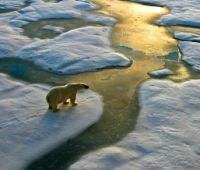

The melting of the Greenland ice sheet adds approximately 1mm a year to global ocean levels. Now scientists are increasingly concerned that the ice sheet could melt quicker than before due to warmer conditions that are encouraging the growth of algae on the ice. This means that the ice is "darker", and darker ice absorbs more solar radiation than normal, clean white ice, meaning more melting could occur.
White snow will reflect around 90% of solar radiation. However, dark patches of algae will only reflect around 35% or even just 1% in the blackest spots.
Given the huge size of the Greenland ice sheet - approximately seven times the size of the UK - if the whole thing melted then the average sea level around the world would rise by about seven metres, which could have a significant impact on countries around the world.
Although algae was first spotted on the ice over 100 years ago, scientists are only just beginning to realise its potential impact. A five-year UK project has started, known as Black and Bloom, which aims to investigate the algae and how it spreads. This knowledge will then be used to improve computer projections of sea level rise. The major concern now is that rising temperatures will allow algae to flourish.
Dr Joe Cook, a glacial microbiologist at Sheffield University, said, "When we say the ice sheet is melting faster, no one saying it's all going to melt in next decade or the next 100 years or even the next 1,000 years but it doesn't all have to melt for more people to be in danger - only a small amount has to melt to threaten millions in coastal communities around world."
The Black and Bloom project aims to publish its sea level projections in two years' time.